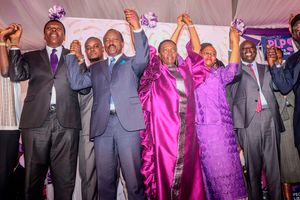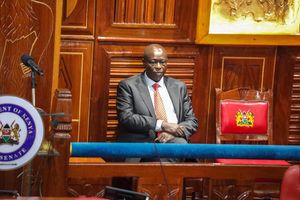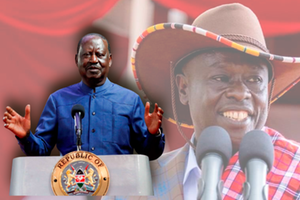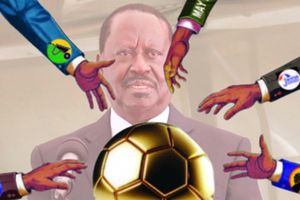
Former Deputy President Rigathi Gachagua during an interview at his Karen home on December 1, 2024.
Impeached Deputy President Rigathi Gachagua’ plan for legislators allied to him to resign and trigger by-elections has echoes from the past even though there are those who view his push as diametrically different from previous constructs.
In 1966, the late Jaramogi Oginga, who had resigned as Vice President to form Kenya People’s Union (KPU), caused a “little general election” after his allied MPs severed their ties with the ruling party KANU and crossed the floor in the National Assembly to the opposition benches.
Jaramogi resigned from KANU after ideologically disagreeing with then President, the late Jomo Kenyatta.
Former Speaker of the National Assembly Kenneth Marende warns that Mr Gachagua’s call makes sense in a democracy like Kenya if one has substantively fallen out with the leadership-that-be, but it is fraught with many risks.
“The person pushing for the resignation of his allied MPs has some work to do, especially on his credibility as a former public servant. Mr Gachagua was impeached by parliament of Kenya, meaning he cannot hold a public office and therefore, has no locus to make people resign,” says Mr Marende.
Those who support the mass resignation plot consider it a strong political statement by seeking a new mandate and a vote of confidence in Mr Gachagua and vice versa for the president.
But those against it consider the move unnecessarily disruptive to the country and risky for those who resign as there are no guarantees that they would retain their seats.
Generally, such calls are often resisted, considering the political risks and resources involved.
Post the “little general election” of 1966, individual politicians resigned and sought fresh mandates.
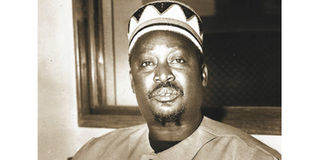
The late Jaramogi Oginga Odinga. Commonly known as the doyen of Kenyan opposition politics.
In 1996, Mr Raila Odinga, then MP for Lang’ata, quit his Ford Kenya party and successfully sought a fresh mandate from the people after beating the KANU machinery to a pulp.
Politicians have also successfully changed parties but when preparing for a general election usually after Houses of Parliament have adjourned sine die.
Mr Marende notes that until Mr Gachagua is cleared by the courts, he cannot even hold an office in a political party were he to form one “because parties are public entities by virtue of their funding from the exchequer.”
“Mr Gachagua goes down the annals of history as the first DP to be impeached. He has a hell load on his shoulders that he has to clear before appealing to the people. He has no credibility and his public utterances are hollow,” said Mr Marende.
Impeachment is a fiat which entails that one cannot hold a public office in line with Article 75 of the Constitution.
On April 14, 1966, Jaramogi formally resigned as Vice President in the founding President Kenyatta’s government after adjudging himself an “unwanted person” by his colleagues in government.
Four days after his resignation, 29 MPs in the then bicameral parliament- National Assembly and Senate- resigned en masse from KANU in the footsteps of Jaramogi and joined KPU.
“The present enemy is more ruthless and inhuman than the open colonialism we fought against,” Jaramogi warned Kenyatta, noting that he saw it fit to no longer be part of the government.
“The government was ruled by underground masters serving foreign interests and who had chosen to ignore the voice of the people,” Jaramogi said in reference to the US government’s preference for Tom Mboya.
The US viewed Mboya as more appealing to Jaramogi, who in the midst of the Cold War, was seen as sympathetic to Russia.
On April 25, 1966, Ramogi Achieng Oneko, then Minister for Information and Broadcasting, also resigned from the Kenyatta government.
In his resignation statement, Oneko made it clear that he did not regret his “bold move.’
“I have waited for too long to be dropped from the cabinet and have now decided to quit with no apologies or regrets to make,” said Oneko.
Soon after their resignations, the MPs crossed the floor in the National Assembly and immediately sought recognition in the House from then Speaker Humphrey Slade, through a notification, as the official opposition.
At the time, there was no requirement in law to have MPs ditching the parties that sponsored them to the House to seek a fresh mandate from the people by way of by-election.
Unknown to the Jaramogi allied MPs, they were soon to be caged in a corner.
KANU, in its determination to teach Jaramogi and his KPU allied MPs a lesson, engineered the passage of a law requiring any MP who resigns from their parties for rival parties to seek a fresh mandate from the people.
This was orchestrated by Mboya to frustrate, rig out and financially drain the then newly founded KPU.
As fate would have it, all the MPs who left KANU to join KPU were forced to defend their seats against KANU-sponsored candidates.
In the ensuing “little general election”, KANU got 20 while KPU got nine MPs largely from Luo Nyanza.
Thereafter, Jaramogi and his allies became wanted men by the government machinery keen on playing rough and dirty games on them.
Kenyatta himself led the onslaught against KPU, branding it a clandestine organization.
“When speaking as a leader of the government I am mild. But when speaking as a leader of a ruling party I can be kali (ferocious). If anybody dares to spoil the party that fought for Uhuru (Independence), he will be dealt with firmly. We shall crush him into powder,” said Kenyatta.
Kenyatta added; “The time for mercy is over. There is total war on KPU.”
This was followed by the arrest on February 17, 1967 of KPU Vice President Bildad Kaggia.
He was detained without the option of fine and on April 18, 1968, he was sentenced to 12 months in jail that would later be reduced to 6 months on appeal.
In 1992, defectors lured from the opposition by then President Moi’s KANU after the 1992 elections also had to seek re-election.
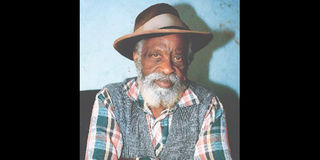
Freedom fighter Bildad Kaggia
Mr Raila Odinga’s Cord once threatened to force a mini-general election by kicking out its members who had shifted allegiance to Jubilee in 2016 but this did not happen.
City lawyer David Ochami, political analyst Barrack Muluka and former Runyenjes MP Mtumishi Njeru Kathangu noted that politicians always plot against their opponents to harass and drain them, create momentum for the next battle and gauge their support and capabilities.
Similar views are also shared by the University of Nairobi (UoN) don Mr Herman Manyora.
Mr Ochami argues that Mr Gachagua wants to inflict pain on President Ruto as some kind of revenge after his impeachment to distract the Kenya Kwanza regime’s agenda and create a momentum for 2027.
He adds: “In case there will be by-elections with the formation of Gachagua's party, Ruto will use immense resources at UDA disposal to harass and drain Gachagua as he gauges UDA fortunes in Mt Kenya,” says Mr Ochami.
Mr Muluka says Mr Gachagua’s push is unrealistic as MPs and any other elected leader dread elections as “they are very costly and the outcome unpredictable.”
“Even those with fine chances of winning don’t like the entire drudgery of electioneering,” says Mr Muluka.
The only time this has happened in Kenya, Mr Muluka says, was after the 1992 elections, when President Moi raided Ford Asili in Shinyalu, Ikolomani, Lugari, Malava, and Lurambi constituencies.
“In the case of Raila, the need to establish himself as the Luo supremo and Jaramogi’s successor overrode all other considerations," says Mr Muluka adding; “these variables are absent for the Mount Kenya MPs.”

Former Prime Minister Raila Odinga.
“Gachagua has dialled the wrong number. He risks slowing down the momentum of his gains against President Ruto in the Mountain. He’s stretching the goodwill too far,” argues Mr Muluka.
Mr Manyora observes that Mr Gachagua's talk of "little general elections" could be more of a threat than something to be actualized.
“However, should his loyal MPs resign en masse, they would certainly be re-elected and they would also become heroes in the Mount Kenya region,” says Mr Manyora.
Mtumishi Kathangu notes that the push by Mr Gachagua is akin to the kingdom fighting itself and “therefore, cannot last.”
“When the movement called for resignations in the past, it was moved by extreme and sadistic oppression meted on the people. These calls were also based on some ideological considerations motivated by the general aspirations of the Kenyan society,” says Mtumishi Kathangu.
He reveals that in the midst of such political behaviours, the country and its people did not achieve anything constructive.
“Kenya has witnessed the worst betrayals and conspiracies against the people than any other country proclaiming democracy in Africa, maybe, the world. The current situation reminds me of perpetrators of, in the past, who just passed by the changing room for another attire.”
Mtumishi Kathangu did not shy away from reminding politicians that the majority of those in public offices today are creatures of the high office “which unfortunately the deposed DP was part of.”
“We are in a creeping dictatorship which has been able to draw and create conspiracies to ascend power and keep it. I would not ever assume that the issue of resignation is not part of these conspiracies although from a distance it is motivated by removal from office and the comforts which go with it,” he says.
Prof Rok Ajulu, in his book; Thinking Through The Crisis of Democratization in Kenya, notes that 1966 had exposed the authoritarian face of Kenyatta and KPU’s banning in 1969 revealed the fundamental feature of the political culture- the refusal of the Kenyatta regime to accept democratic challenges to its right to rule.
“The kleptocratic and predatory elite associated with the Kenyan state have relied on repressive apparatuses rather than representative institutions as instruments of legitimating their class rule,” says Prof Ajulu.
Prof Ajulu observes that despite the introduction of 'democracy' and multi-party politics in 1992, nothing much “seemed to have changed.”

